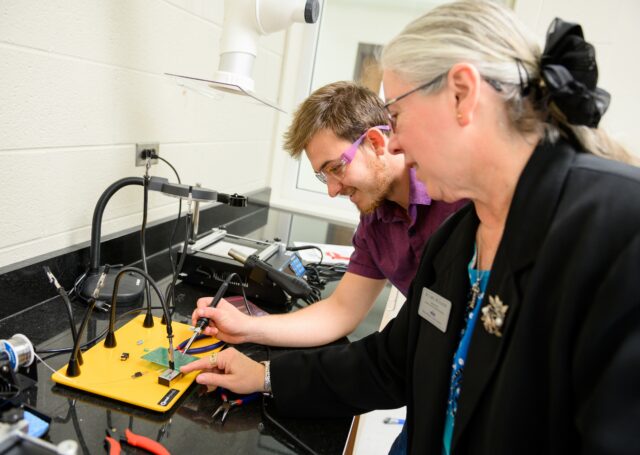A Bachelor of Science in Electrical Engineering is a professional degree program that prepares students for careers in a variety of industries. The degree provides students with the necessary technical and managerial skills to enter the workforce in the design application, installation, manufacturing, operation and maintenance of electrical systems. Students gain hands-on experience throughout the program and learn the foundational electronics, mathematics, physics, communications control systems and computing necessary to solve real-world problems in an ethical and socially-responsible manner. Students will learn the skills necessary to build, manufacture, operate, maintain and improve complex electrical systems. Graduates will have strong communication skills and are capable of communicating with a range of audiences, as well the ability to work as a productive member of an interdisciplinary team.
The BS in Electrical Engineering is accredited by the EAC Accreditation Commission of ABET, under the commission’s General Criteria and Program Criteria for Electrical, Computer, Communications, Telecommunication(s), and Similarly Named Engineering Programs.
Why Should I Major in Electrical Engineering?
Electrical engineers enjoy excellent job prospects because they are always needed—numerous current articles list electrical engineering as one of the most in-demand jobs for 2019 and the foreseeable future. Electrical engineers work in almost every industry, including power, music, electronics, medicine and entertainment, giving graduates a wide variety of career options. At the Webb School of Engineering, we are committed to incorporating the latest trends in technology and in engineering education into our curriculum At High Point, students have access to state of the art equipment from top manufacturers, both in electrical courses such as electronics, and in the Maker Space supporting our freshman and senior design courses.
Learn more about the Webb School of Engineering.
Student Outcomes
Our programs have documented student outcomes that support the program educational objectives.
Engineering Student Outcomes
At the time of graduation, students in the Electrical or Computer Engineering at HPU will have:
- an ability to identify, formulate, and solve complex engineering problems by applying principles of engineering, science, and mathematics
- an ability to apply engineering design to produce solutions that meet specified needs with consideration of public health, safety, and welfare, as well as global, cultural, social, environmental, and economic factors
- an ability to communicate effectively with a range of audiences
- an ability to recognize ethical and professional responsibilities in engineering situations and make informed judgments, which must consider the impact of engineering solutions in global, economic, environmental, and societal contexts
- An ability to function effectively on a team whose members together provide leadership, create a collaborative environment, establish goals, plan tasks, and meet objectives
- an ability to develop and conduct appropriate experimentation, analyze and interpret data, and use engineering judgment to draw conclusions
- an ability to acquire and apply new knowledge as needed, using appropriate learning strategies.
Program Objectives
For Electrical and Computer Engineering, Program Educational Objectives (PEOs) are reviewed by faculty and Industrial Advisory Board (IAB) in the spring of odd years. Student input is captured in a survey conducted in the final semester of the capstone class. The PEOs developed through this process and most recently approved by the IAB on April 27, 2023, are as follows:
Three to five years after graduation, the graduates of Electrical or Computer Engineering at HPU will:
- Be employed or be pursuing graduate degrees in their disciplines or in a closely related field.
- Be progressing toward professional licensure.
- Be continuing to develop their knowledge, sense of ethics, and skills in engineering through means such as professional societies, engineering conferences, mentorship opportunities, and formal or informal courses.
- Be fully contributing, and actively adding value, to their businesses or academic organizations, and developing as professionals.
Unique Course Offerings
- Advanced Control Systems
- CAD/CAM Fundamentals
- Circuits
- Communications Systems
- Digital Logic and Computer Systems
- Discrete Structures
- Economics for Engineers
- Instrumentation and Control Systems
- Mathematical Methods for Engineering and Physics
- Operating Systems
- Power Systems
- Programming in MATLAB
- Signals and Systems
- Solid State Devices
| Degree Requirements | Credits |
|---|---|
| Major Requirements | 85 |
| University Core Requirements | 36-44 |
| Electives | 0-7 |
| Total | 128-129 |
| Course | Course Title | Credits |
|---|---|---|
| CSC 1710 | Introduction to Programming | 2 |
| CSC 1720 | Advanced Programming with Data Structures | 2 |
| ECE 1012 | Introduction to Engineering Design and CAD/ CAM | 4 |
| ECE 1015 | Programming in Matlab | 1 |
| ECE 2605 | Digital Logic and Computer Systems | 4 |
| ECE 2610 | Circuits I | 4 |
| ECE 3105 | Signals and Systems | 4 |
| ECE 3401 | Engineering Electromagnetics | 4 |
| ECE 3610 | Circuits II | 4 |
| ECE 4140 | Power Systems | 4 |
| ECE 4200 | Electronics I | 4 |
| ECE 4210 | Communication Systems | 4 |
| ECE 4510 | Control Systems | 4 |
| ECE 4630 | Solid State Devices | 4 |
| ECE 4900 | Engineering Senior Design Project I | 2 |
| ECE 4910 | Engineering Senior Design Project II | 2 |
| MTH 1415 | Mathematics for Engineers I | 4 |
| MTH 1425 | Mathematics for Engineers II | 4 |
| MTH 2050 | Mathematical Methods for Engineering and Physics I | 4 |
| MTH 2150 | Mathematical Methods for Engineering and Physics II | 4 |
| PHY 2020 | Fundamentals of Physics II | 4 |
| STS 3005 | Probability and Statistics or Engineers | 4 |
| Select 4 credits from CSC 2342, ENV 1110 or above, BIO 1500/1501 or above, CHM 1010/1011 or above, PHY 2030, PHY 3000 or above, MTH 2310, MTH 2880 or above, or as approved by the Chair of the Department of Electrical and Computer Engineering. | ||
**Satisfies the Social Science core requirement.
***Satisfies the Quantitative Reasoning core requirement.
****Satisfies the Natural Science core requirement.
Both Computer and Electrical Engineering graduates’ prospects include companies such as the following:
- Amazon
- Apple
- AT&T
- Boeing
- HBO
- IBM
- Lockheed Martin
- Microsoft
- Oracle
- Tesla
- Amazon
- Apple
- AT&T
- Boeing
- HBO
- IBM
- Lockheed Martin
- Microsoft
- Oracle
- Tesla






